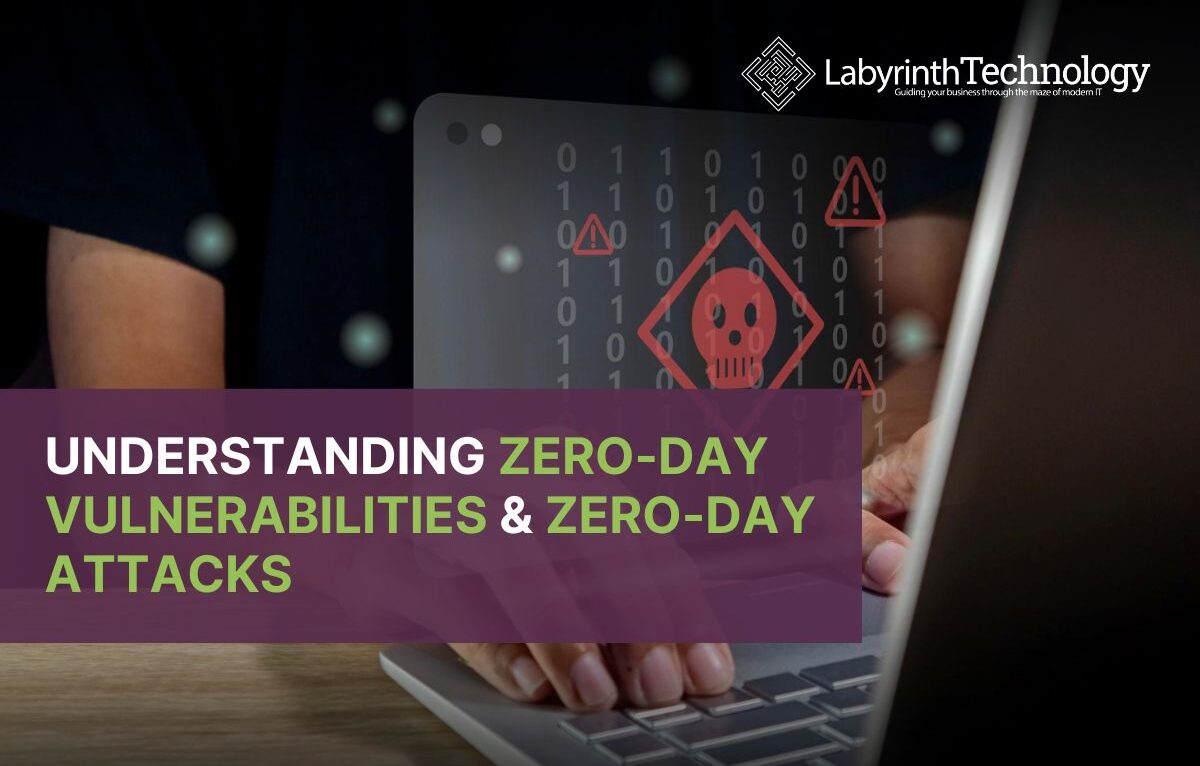
Imagine a flaw in a system—a hidden crack no one knows about. Now picture a malicious actor discovering this flaw before the system’s creator does, and exploiting it to steal data, cause disruption, or get into networks. This is the world of zero-day vulnerabilities—a term that sounds like something out of a sci-fi movie but is a very real concern for businesses everywhere. At Labyrinth Technology we provide IT services and support for small and medium sized businesses and have seen firsthand how damaging these can be if left unpatched.
A zero-day vulnerability is a security flaw in software, hardware or firmware that the vendor or developer doesn’t know about. The term “zero day” means there has been zero time to fix the issue or create a patch before it’s exploited. Cybercriminals find these flaws first and develop an exploit for them, known as a zero-day exploit. When an exploit is used to compromise a system it becomes a zero-day attack.
What makes zero-day attacks so dangerous is their stealth and unpredictability. Because the vulnerability is unknown, there’s no defence in place to stop the attack. Attackers use this to their advantage, striking swiftly and leaving organisations scrambling to respond.
Zero-day vulnerabilities can occur anywhere in a system. Common places include operating systems, web browsers or plugins. A bug in a popular browser for example could allow an attacker to execute malicious code just by getting a user to visit a compromised website. A vulnerability in software applications such as email clients or office productivity tools could give an attacker a foothold to get to sensitive data. That’s why missing data encryption should never be an option.
In some cases the problem is in the firmware—the software that controls the hardware. A vulnerability in a network router’s firmware for example could give an attacker control of the entire network. The variety of potential targets shows we need to have comprehensive security that covers not just software but hardware and other components.
It’s comforting to think that your systems are secure, especially if you’ve invested in strong firewalls, antivirus software, and regular updates. But the reality is that no system is completely immune. Even the most well-maintained infrastructure can have hidden vulnerabilities, often introduced through new software releases, third-party integrations, or simply the sheer complexity of modern IT environments.
Zero-day vulnerabilities remind us that security is not a one-time effort. It’s an ongoing process of vigilance, preparation, and adaptation. Complacency can be costly, especially for small and medium-sized businesses, which may not have the resources to recover quickly from a cyberattack.
A zero-day exploit is a direct consequence of overlooked security vulnerabilities, often hidden within complex systems and applications. The urgency of these attacks stems from the fact that software vendors and software developers have no advance warning; they’re scrambling to fix the issue only after it’s been exploited. While security researchers race to uncover and mitigate these risks, cybercriminals aim to exploit vulnerabilities to their fullest extent, often targeting valuable business data such as customer records or financial information. In the worst scenarios, an attacker might release a malicious computer worm capable of spreading across networks before anyone realises what’s happening.
These zero-day threats have far-reaching implications. A single zero-day hack can compromise password security, disrupt critical operations, or expose sensitive information. The challenge lies in the time it takes for security patches to be developed and deployed. Businesses are left vulnerable until the fix is available, underscoring the need for proactive measures like robust encryption, regular updates, and network monitoring. No system is perfect, but staying alert and partnering with trusted security experts ensures you’re better prepared for the unexpected.
Preparation is key when the unknown is the enemy. While you can’t predict when or where a zero-day vulnerability will appear, there are steps you can take to reduce risk and respond when an attack happens.
First and foremost being proactive with security is crucial. Regularly updating software, operating systems and firmware can close known vulnerabilities and reduce the impact when a zero-day exploit is found. Keeping an eye on vendor announcements and patch releases is also important as they often provide fixes for newly discovered threats.
Next consider using advanced threat detection tools. Traditional antivirus software may not be able to detect zero-day exploits but behaviour based detection systems can detect unusual activities that indicate a potential attack. These tools use machine learning and other technologies to analyze patterns and respond in real time.
Another layer of defence is network segmentation. By segmenting your network into smaller, isolated areas you can limit the spread of an attack and protect your most sensitive data. This way even if an attacker gets into one part of your system they won’t have access to the whole network.
Small and medium sized businesses (SMBs) are most at risk to zero-day attacks. Unlike large enterprises SMBs don’t have dedicated cyber security teams or the budget for advanced tools. Attackers know this and target SMBs as the low hanging fruit.
But being a smaller business doesn’t mean you’re powerless. Working with a trusted IT services provider like Labyrinth Technology can give you access to the expertise and resources to protect against advanced threats. We help businesses implement robust security, monitor for vulnerabilities and respond to incidents all tailored to the needs of SMBs.

At Labyrinth Technology we make IT simple, effective and secure for small to medium sized businesses. We understand the challenges you face – growing and innovating while protecting your business. With years of experience and a tailored approach we are your trusted IT partner to keep your systems secure and efficient.
We don’t believe in one-size-fits-all solutions. Every business has its own needs, vulnerabilities and opportunities and we take the time to understand yours. From implementing advanced security measures like multi-factor authentication and network segmentation to training and guidance for your employees our approach is comprehensive yet tailored. We combine the latest technology with practical strategies so your defences are not only strong but also flexible. At Labyrinth Technology we don’t just react to threats we help you anticipate and prevent them, build resilience into the very fabric of your business. Contact us for a free consultation.
Empowering London Businesses with Efficient IT Solutions to Save Time and Stay Ahead of the Competition.